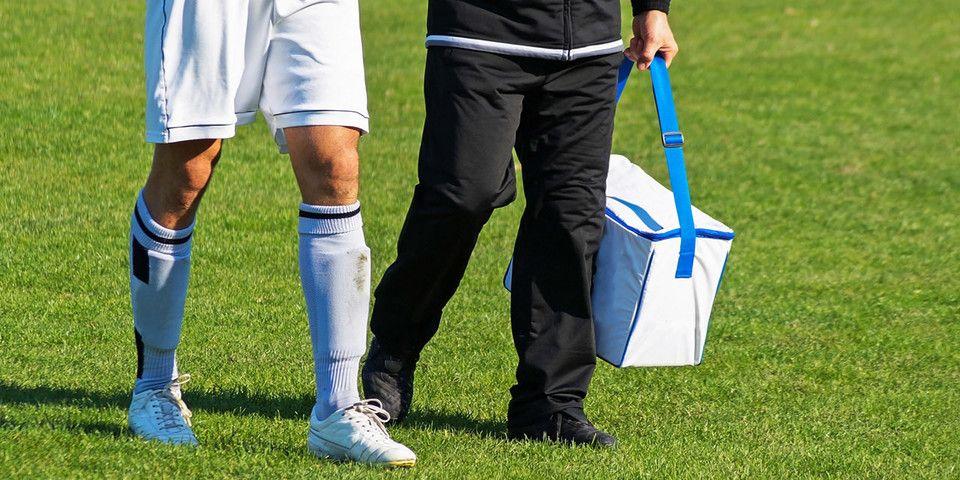The Ultimate Guide to Preventing Ultimate Frisbee Injuries
Many of the Most Common Ultimate Frisbee Injuries Can Be Avoided
Ultimate frisbee athletes play hard. Ultimate frisbee injury statistics alone are a remarkable testament to the intensity (and dangerous nature) of this activity.
The majority of players who play ultimate frisbee on a regular basis experience orthopaedic ultimate frisbee injuries. Of these injuries, muscle strains are the most common, having affected a full 76% of polled players at one time or another. Ankle (65%), knee (53%), and shoulder injuries (37%) were the most frequently injured anatomical regions, with hand and injuries also a common threat.
Does this elevated risk mean that athletes should avoid ultimate frisbee activity? Of course not; ultimate frisbee is a healthy activity when approached with proper precautions. And the good news is that effective ultimate frisbee injury prevention measures exist that can be easily implemented for maximum safety while at play.
Common Ultimate Frisbee Injuries (And How to Prevent Them)
At Rothman Orthopaedic Institute, we specialize in Sports Medicine. That means we’ve personally treated the orthopaedic injuries that ultimate frisbee players tend to experience; and it means that we can offer players the injury prevention tips needed in order to reduce the risk of accidents and promote safety on the field.
We’ve structured this guide to ultimate frisbee injury prevention by anatomical region, highlighting common injuries and the steps that can be taken to avoid them. Read on and have a safe season!
Ankle Injuries
Inversion (inward) and eversion (outward) sprains are frequently suffered by ultimate frisbee players. When the trauma that causes a sprain is of a particularly high degree, an ankle fracture may also occur. Ankle sprains and fractures are best prevented with the following measures:
-
Thorough warm-ups prior to frisbee activity
-
Wearing properly fitted athletic shoes
-
Attentiveness to uneven surfaces
-
Reducing or ceasing activity if ankle pain emerges
Knee Injuries
The most common ultimate frisbee knee injuries are sprains and strains of the connective tissues associated with the knee joint. A sprain is a stretching or tear of a ligament; a strain, meanwhile, describes a stretched or torn tendon. The most common injuries of these types to affect ultimate frisbee players include Iliotibial (IT) band syndrome and anterior cruciate ligament (ACL) tears.
Because IT band syndrome is an overuse injury, preventative measures should be aimed at muscle and ligament acclimation and conditioning; daily stretching is similarly important. If symptoms begin to emerge, it is recommended to reduce activity immediately. ACL injuries are best avoided by working with a personal trainer to implement jumping and pivoting exercises into training routines.
Shoulder Injuries
Traumatic shoulder injuries are relatively rare among ultimate players. Rather, overuse injuries (such as strains of the muscles associated with throwing motions) are much more common. Left unattended, a tear of shoulder muscle or connective tissues may occur. A fall can lead to fractures or a dislocation of the shoulder.
Prevention measures should largely be focused at the moderation of activity. Repetitive arm motions should be carefully limited.
Head Injuries
Ultimate frisbee presents a serious risk for concussions. These may occur due to a number of accidents, including head contact with fellow players, head collisions with flying discs, and trips that result in head-to-ground collisions.
Situational awareness is key to preventing ultimate frisbee head injuries. Pay careful attention to your surroundings and any obstacles, including uneven or slippery surfaces and other players.
Hand Injuries
A fall onto outstretched hands may protect your head and torso from injury, but it often can result in a hand injury. Forceful impact with discs and fellow players may also result in a number of hand injuries, including wrist fractures, finger dislocations, finger fractures, and jammed fingers or wrists.
If a collision or slip occurs, attempt to fall to your knees rather than onto outstretched hands. Much like head injuries, situational awareness is also key to avoiding hand injuries.
Care For Ultimate Frisbee Injuries At Rothman Orthopaedic Institute
These prevention tips will help you to stay safe during activity. It is impossible, however, to completely eliminate the risk of ultimate frisbee injuries. If you have experienced an injury and are in need of specialized Sports Medicine care, Rothman Orthopaedic Institute can provide you with the most effective treatment options available. To learn more or to schedule an appointment, please visit us here or contact us at 1-800-321-9999.
Related Physicians
Related Specialties
Related Conditions
- Ankle Sprains and Fractures
- Anterior Cruciate Ligament (ACL) Injury
- Arthritis - Foot and Ankle
- Floating Shoulder
- Knee - Loose Bodies/Spurs
- Knee Arthritis
- Little League Shoulder
- Runner's Knee (Chondromalacia Patella)
- Running / Pivoting / Jumping Injuries
- Shoulder Arthritis
- Shoulder Dislocation
- Shoulder Impingement Syndrome
- Shoulder Instability
- Shoulder Separation
- Women's Sports Injuries
Related Treatments
- Ankle Sprain and Fracture Surgeries
- Bilateral Knee Replacement
- Closed Reduction (Shoulder)
- Foot and Ankle Surgery
- Loose Bodies/Spurs Surgery (Knee)
- Minimally Invasive Knee Surgery
- Non-operative Foot and Ankle Treatments
- Non-operative Knee Arthritis Treatment
- Non-operative Runner's Knee (Chondromalacia Patella) Treatment
- Non-operative Shoulder Instability Treatment
- Partial Knee Replacement (Unicompartmental and Patellofemoral Replacement)
- Shoulder Arthritis Treatment
- Shoulder Replacement Surgery
Related Programs
-

Athletic Training- Sport Medicine Outreach
Our Field Athletic Trainers provide direct sports medicine care to youth, high school, college and professional athletes. Rothman AT’s provide athletic training services throughout Southeastern PA to interscholastic high schools, colleges, as well as tournaments and special events.Read More -

Women’s Sports Medicine Program
The Women’s Sports Medicine Program at the Rothman Orthopaedic Institute is the first of its kind in the Philadelphia metro area and one of only several such programs specializing in the comprehensive care of the female athlete in the country.Read More




